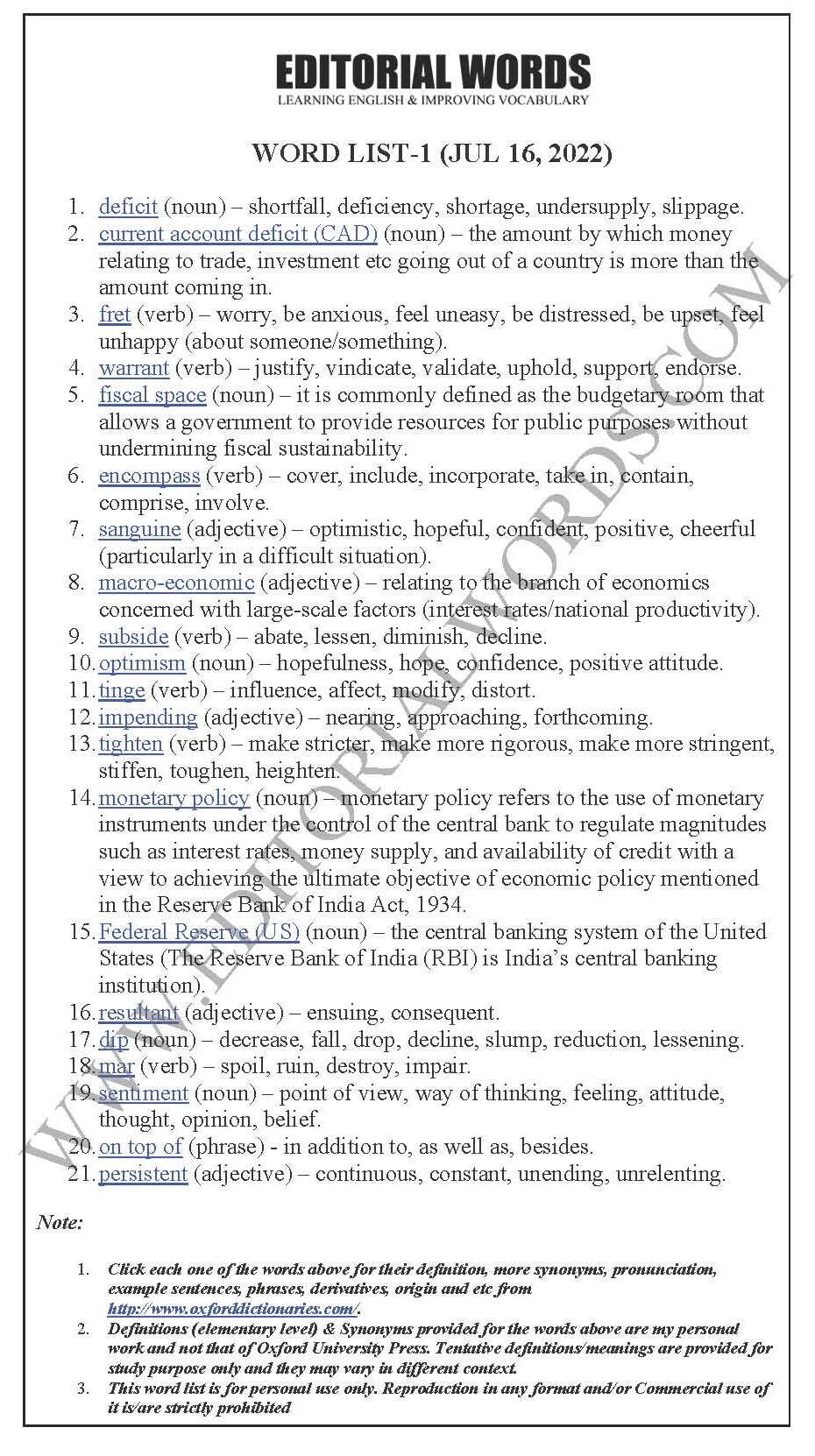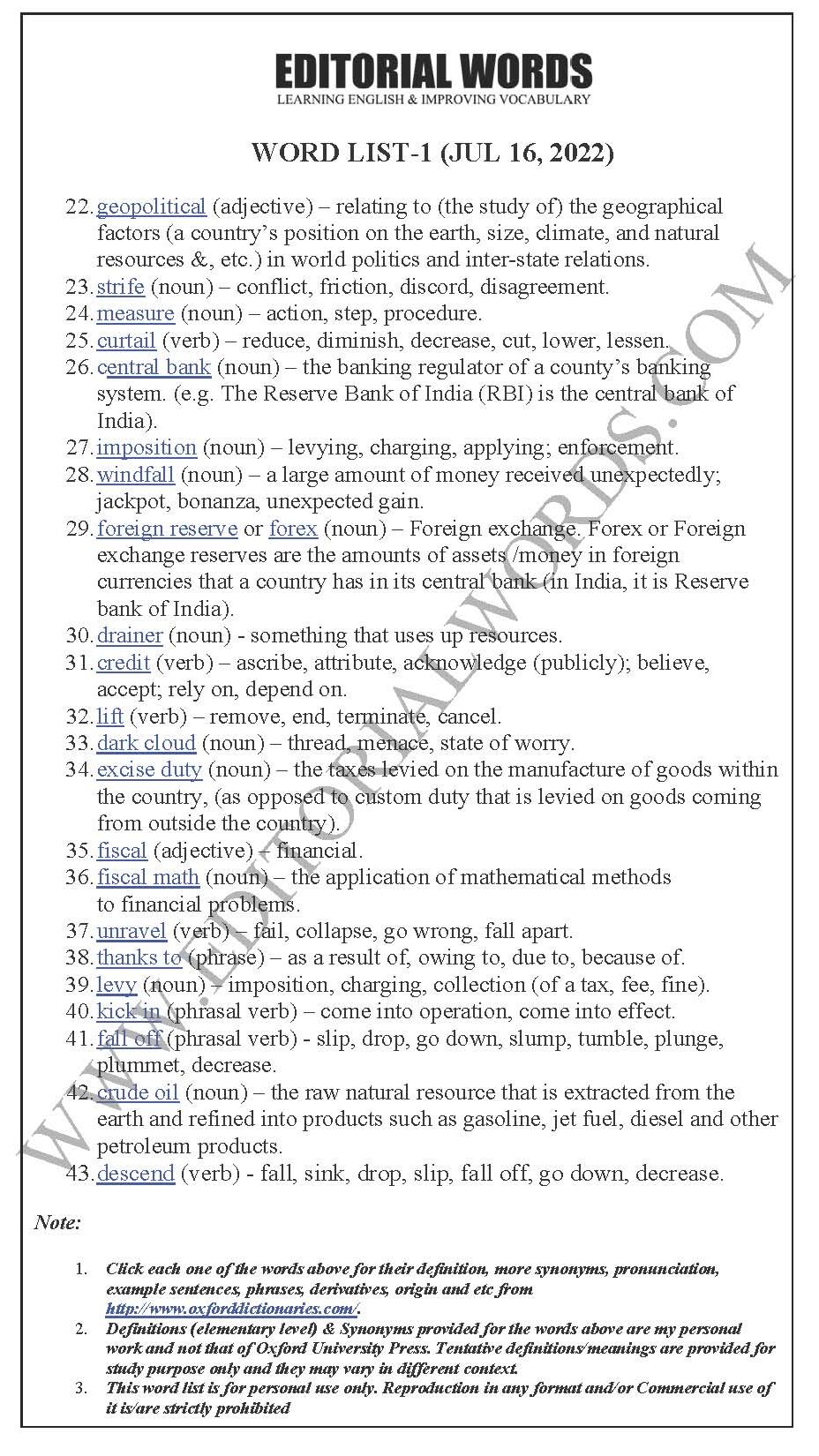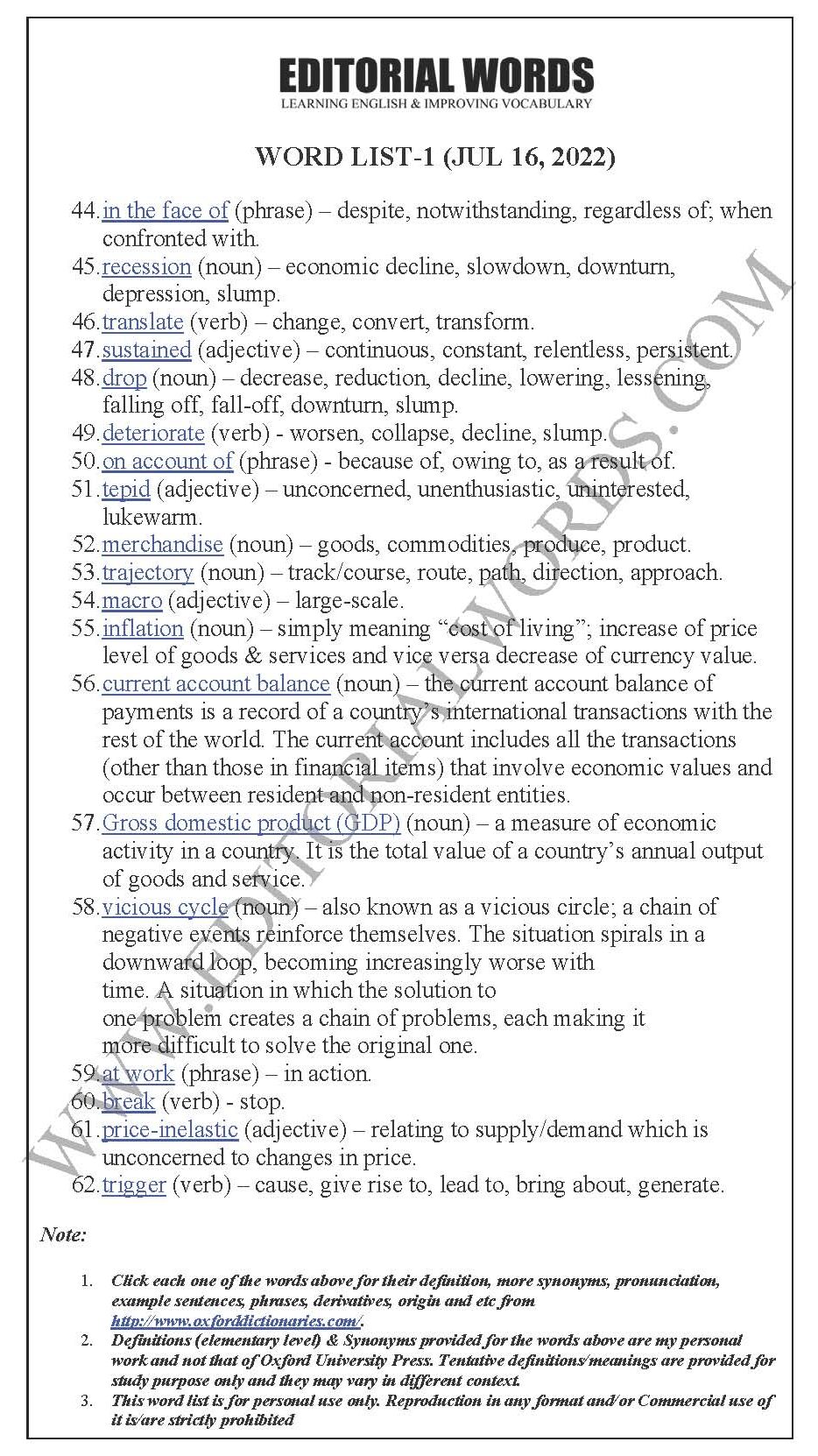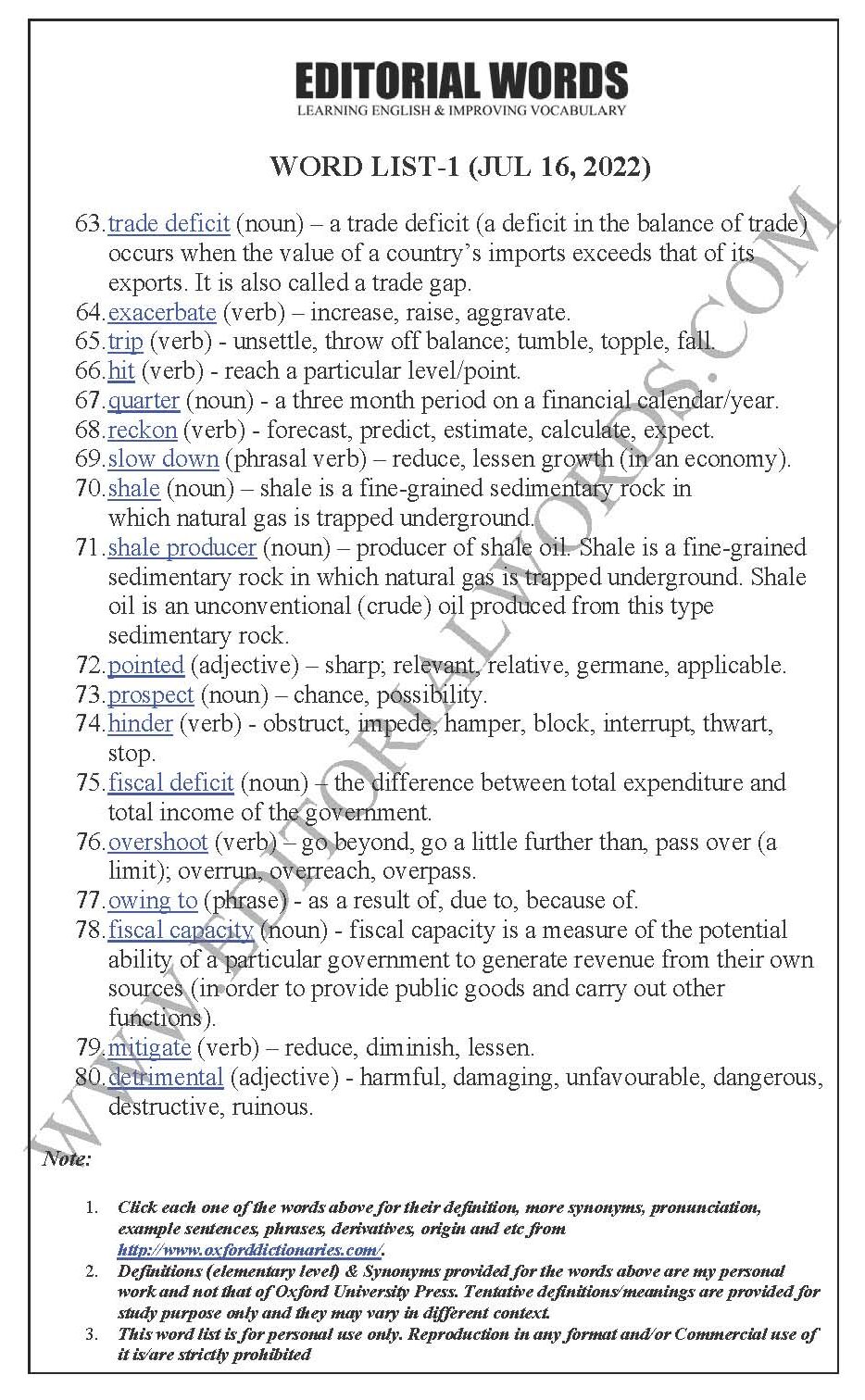The Hindu Editorial (Deficit doubts) – Jul 16, 2022
In its latest review of the economy encompassing the period from June till July 10, the Finance Ministry is sanguine about India’s economic recovery and… For further reading, visit “The Hindu”. Below is today’s word list-1 for The Hindu Editorial (Deficit doubts) – Jul 16, 2022.
To read this article, click “The Hindu”.
This preview is provided here with permission.
Courtesy: The Hindu
The Hindu Editorial (Deficit doubts) – Jul 16, 2022:
- deficit (noun) – shortfall, deficiency, shortage, undersupply, slippage.
- current account deficit (CAD) (noun) – the amount by which money relating to trade, investment etc going out of a country is more than the amount coming in.
- fret (verb) – worry, be anxious, feel uneasy, be distressed, be upset, feel unhappy (about someone/something).
- warrant (verb) – justify, vindicate, validate, uphold, support, endorse.
- fiscal space (noun) – it is commonly defined as the budgetary room that allows a government to provide resources for public purposes without undermining fiscal sustainability.
- encompass (verb) – cover, include, incorporate, take in, contain, comprise, involve.
- sanguine (adjective) – optimistic, hopeful, confident, positive, cheerful (particularly in a difficult situation).
- macro-economic (adjective) – relating to the branch of economics concerned with large-scale factors (interest rates/national productivity).
- subside (verb) – abate, lessen, diminish, decline.
- optimism (noun) – hopefulness, hope, confidence, positive attitude, buoyancy.
- tinge (verb) – influence, affect, modify, distort.
- impending (adjective) – nearing, approaching, forthcoming.
- tighten (verb) – make stricter, make more rigorous, make more stringent, stiffen, toughen, heighten.
- monetary policy (noun) – monetary policy refers to the use of monetary instruments under the control of the central bank to regulate magnitudes such as interest rates, money supply, and availability of credit with a view to achieving the ultimate objective of economic policy mentioned in the Reserve Bank of India Act, 1934.
- Federal Reserve (US) (noun) – the central banking system of the United States (The Reserve Bank of India (RBI) is India’s central banking institution).
- resultant (adjective) – ensuing, consequent.
- dip (noun) – decrease, fall, drop, decline, slump, reduction, lessening.
- mar (verb) – spoil, ruin, destroy, impair.
- sentiment (noun) – point of view, way of thinking, feeling, attitude, thought, opinion, belief.
- on top of (phrase) – in addition to, as well as, besides.
- persistent (adjective) – continuous, constant, unending, unrelenting, unceasing.
- geopolitical (adjective) – relating to (the study of) the geographical factors (a country’s position on the earth, size, climate, and natural resources &, etc.) in world politics and inter-state relations.
- strife (noun) – conflict, friction, discord, disagreement.
- measure (noun) – action, step, procedure.
- curtail (verb) – reduce, diminish, decrease, cut, lower, lessen.
- central bank (noun) – the banking regulator of a county’s banking system. (e.g. The Reserve Bank of India (RBI) is the central bank of India).
- imposition (noun) – levying, charging, applying; enforcement.
- windfall (noun) – a large amount of money received unexpectedly; jackpot, bonanza, unexpected gain.
- foreign reserve or forex (noun) – Foreign exchange. Forex or Foreign exchange reserves are the amounts of assets /money in foreign currencies that a country has in its central bank (in India, it is Reserve bank of India).
- drainer (noun) – something that uses up resources.
- credit (verb) – ascribe, attribute, acknowledge (publicly); believe, accept; rely on, depend on.
- lift (verb) – remove, end, terminate, cancel.
- dark cloud (noun) – thread, menace, state of worry.
- excise duty (noun) – the taxes levied on the manufacture of goods within the country, (as opposed to custom duty that is levied on goods coming from outside the country).
- fiscal (adjective) – financial.
- fiscal math (noun) – the application of mathematical methods to financial problems.
- unravel (verb) – fail, collapse, go wrong, fall apart.
- thanks to (phrase) – as a result of, owing to, due to, because of.
- levy (noun) – imposition, charging, collection (of a tax, fee, fine).
- kick in (phrasal verb) – come into operation, come into effect.
- fall off (phrasal verb) – slip, drop, go down, slump, tumble, plunge, plummet, decrease.
- crude oil (noun) – the raw natural resource that is extracted from the earth and refined into products such as gasoline, jet fuel, diesel and other petroleum products.
- descend (verb) – fall, sink, drop, slip, fall off, go down, decrease.
- in the face of (phrase) – despite, notwithstanding, regardless of; when confronted with.
- recession (noun) – economic decline, slowdown, downturn, depression, slump.
- translate (verb) – change, convert, transform.
- sustained (adjective) – continuous, constant, relentless, persistent.
- drop (noun) – decrease, reduction, decline, lowering, lessening, falling off, fall-off, downturn, slump.
- deteriorate (verb) – worsen, collapse, decline, slump.
- on account of (phrase) – because of, owing to, as a result of.
- tepid (adjective) – unconcerned, unenthusiastic, uninterested, lukewarm.
- merchandise (noun) – goods, commodities, produce, product.
- trajectory (noun) – track/course, route, path, direction, approach.
- macro (adjective) – large-scale.
- inflation (noun) – simply meaning “cost of living”; increase of price level of goods & services and vice versa decrease of currency value.
- current account balance (noun) – the current account balance of payments is a record of a country’s international transactions with the rest of the world. The current account includes all the transactions (other than those in financial items) that involve economic values and occur between resident and non-resident entities.
- Gross domestic product (GDP) (noun) – a measure of economic activity in a country. It is the total value of a country’s annual output of goods and service.
- vicious cycle (noun) – also known as a vicious circle; a chain of negative events reinforce themselves. The situation spirals in a downward loop, becoming increasingly worse with time. A situation in which the solution to one problem creates a chain of problems, each making it more difficult to solve the original one.
- at work (phrase) – in action.
- break (verb) – stop.
- price-inelastic (adjective) – relating to supply/demand which is unconcerned to changes in price.
- trigger (verb) – cause, give rise to, lead to, bring about, generate.
- trade deficit (noun) – a trade deficit (a deficit in the balance of trade) occurs when the value of a country’s imports exceeds that of its exports. It is also called a trade gap.
- exacerbate (verb) – increase, raise, aggravate.
- trip (verb) – unsettle, throw off balance; tumble, topple, fall.
- hit (verb) – reach a particular level/point.
- quarter (noun) – a three month period on a financial calendar/year.
- reckon (verb) – forecast, predict, estimate, calculate, expect.
- slow down (phrasal verb) – reduce, lessen growth (in an economy).
- shale (noun) – shale is a fine-grained sedimentary rock in which natural gas is trapped underground.
- shale producer (noun) – producer of shale oil. Shale is a fine-grained sedimentary rock in which natural gas is trapped underground. Shale oil is an unconventional (crude) oil produced from this type sedimentary rock.
- pointed (adjective) – sharp; relevant, relative, germane, applicable.
- prospect (noun) – chance, possibility.
- hinder (verb) – obstruct, impede, hamper, block, interrupt, thwart, stop.
- fiscal deficit (noun) – the difference between total expenditure and total income of the government.
- overshoot (verb) – go beyond, go a little further than, pass over (a limit); overrun, overreach, overpass.
- owing to (phrase) – as a result of, due to, because of.
- fiscal capacity (noun) – fiscal capacity is a measure of the potential ability of a particular government to generate revenue from their own sources (in order to provide public goods and carry out other functions).
- mitigate (verb) – reduce, diminish, lessen.
- detrimental (adjective) – harmful, damaging, unfavourable, dangerous, destructive, ruinous.
Note:
1. Click each one of the words above for their definition, more synonyms, pronunciation, example sentences, phrases, derivatives, origin and etc from http://www.oxforddictionaries.com/.
2. Definitions (elementary level) & Synonyms provided for the words above are my personal work and not that of Oxford University Press. Tentative definitions/meanings are provided for study purpose only and they may vary in a different context.
3. This word list is for personal use only. Reproduction in any format and/or Commercial use of it is/are strictly prohibited.
The Hindu Editorial (Deficit doubts) – Jul 16, 2022:




“Phrasal Verbs” We Learnt Last Week
“Idioms & Phrases” We Learnt Last Week
“Important Definitions” We Learnt Last Week
Recent Word Lists For The Hindu Editorial Articles

Be the first to comment